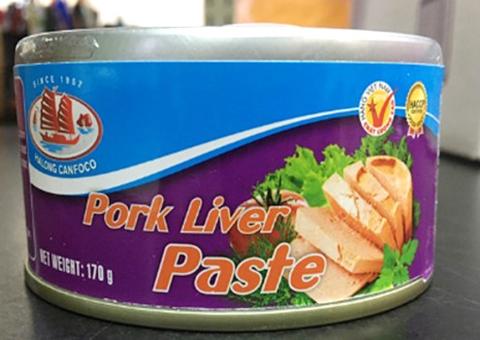To keep African swine fever at bay, Taiwan has banned imports of canned pork products from Vietnam, after a can of food from the Southeast Asian country tested positive for the virus earlier this month, the Council of Agriculture said yesterday.
The council made the announcement at a news conference in Taipei after a meeting of the Central Emergency Operation Center for preventing swine fever.
The council on Dec. 9 confirmed that a can of pig liver paste from Vietnam tested positive for the virus and immediately informed the Ministry of Health and Welfare, Council of Agriculture Minister Chen Chi-chung (陳吉仲) said, adding that it was one of 15 products tested.

Photo courtesy of the Bureau of Animal and Plant Health Inspection and Quarantine
As canned foods are disinfected at high temperatures, the risk of transmitting the virus is very low, he said.
However, even when the virus is killed during disinfection, its nucleic acid can still be detected in a product, said Tsai Shu-chen (蔡淑貞), director of the Food and Drug Administration’s (FDA) Food Safety Division.
The ban on imports of canned pork products from Vietnam was put in place on Tuesday last week, after the FDA completed the relevant paperwork and informed affected businesses, she said.
As of Wednesday last week, the FDA had recalled 529 cans of the product, mainly for consumers’ peace of mind, instead of concern over food security or disease transmission, she said.
Since China reported its first outbreak of African swine fever in August last year, the disease has spread to 10 other Asian countries — Cambodia, Indonesia, Laos, Mongolia, Myanmar, North Korea, the Philippines, South Korea, East Timor and Vietnam — as well as Africa and Europe, council data showed.
As the Lunar New Year holiday is next month, officials have increased inspections at ports and international airports to ensure that officials check inbound luggage and parcels to prevent illegal imports of pork, Chen said.
People caught attempting to carry banned pork products through customs would face a fine of NT$200,000 (US$6,622) for a first offense and NT$1 million for repeat offenses. Foreigners who fail to pay the fine at customs would not be allowed into Taiwan.
From Dec. 13, e-commerce platforms have been required to add warnings for foreign meat products and check if those products have undergone necessary quarantine procedures, the council said, adding that they face a fine of NT$30,000 to NT$150,000 if caught breaching regulations.

AIR SUPPORT: The Ministry of National Defense thanked the US for the delivery, adding that it was an indicator of the White House’s commitment to the Taiwan Relations Act Deputy Minister of National Defense Po Horng-huei (柏鴻輝) and Representative to the US Alexander Yui on Friday attended a delivery ceremony for the first of Taiwan’s long-awaited 66 F-16C/D Block 70 jets at a Lockheed Martin Corp factory in Greenville, South Carolina. “We are so proud to be the global home of the F-16 and to support Taiwan’s air defense capabilities,” US Representative William Timmons wrote on X, alongside a photograph of Taiwanese and US officials at the event. The F-16C/D Block 70 jets Taiwan ordered have the same capabilities as aircraft that had been upgraded to F-16Vs. The batch of Lockheed Martin

GRIDLOCK: The National Fire Agency’s Special Search and Rescue team is on standby to travel to the countries to help out with the rescue effort A powerful earthquake rocked Myanmar and neighboring Thailand yesterday, killing at least three people in Bangkok and burying dozens when a high-rise building under construction collapsed. Footage shared on social media from Myanmar’s second-largest city showed widespread destruction, raising fears that many were trapped under the rubble or killed. The magnitude 7.7 earthquake, with an epicenter near Mandalay in Myanmar, struck at midday and was followed by a strong magnitude 6.4 aftershock. The extent of death, injury and destruction — especially in Myanmar, which is embroiled in a civil war and where information is tightly controlled at the best of times —

China's military today said it began joint army, navy and rocket force exercises around Taiwan to "serve as a stern warning and powerful deterrent against Taiwanese independence," calling President William Lai (賴清德) a "parasite." The exercises come after Lai called Beijing a "foreign hostile force" last month. More than 10 Chinese military ships approached close to Taiwan's 24 nautical mile (44.4km) contiguous zone this morning and Taiwan sent its own warships to respond, two senior Taiwanese officials said. Taiwan has not yet detected any live fire by the Chinese military so far, one of the officials said. The drills took place after US Secretary

THUGGISH BEHAVIOR: Encouraging people to report independence supporters is another intimidation tactic that threatens cross-strait peace, the state department said China setting up an online system for reporting “Taiwanese independence” advocates is an “irresponsible and reprehensible” act, a US government spokesperson said on Friday. “China’s call for private individuals to report on alleged ‘persecution or suppression’ by supposed ‘Taiwan independence henchmen and accomplices’ is irresponsible and reprehensible,” an unnamed US Department of State spokesperson told the Central News Agency in an e-mail. The move is part of Beijing’s “intimidation campaign” against Taiwan and its supporters, and is “threatening free speech around the world, destabilizing the Indo-Pacific region, and deliberately eroding the cross-strait status quo,” the spokesperson said. The Chinese Communist Party’s “threats